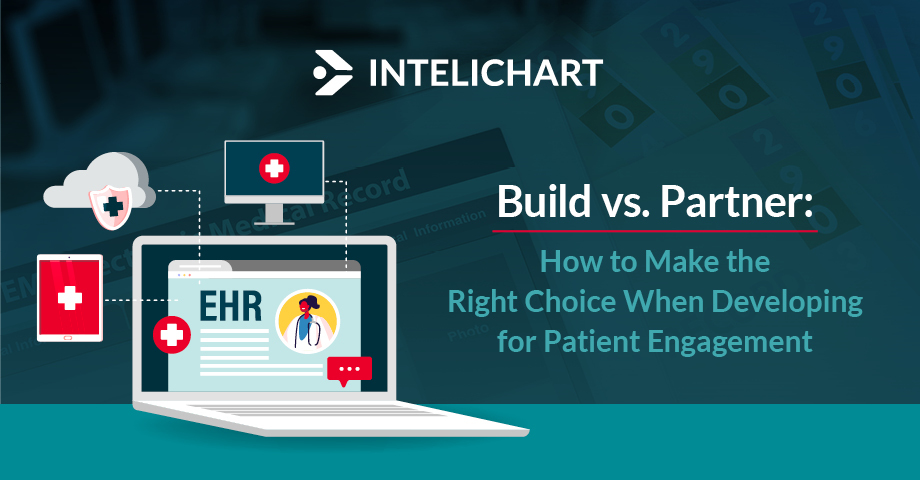
on November 13, 2024 | By The InteliChart Team
Patient data is one of the most sensitive types of information healthcare organizations handle, and its protection is non-negotiable. From medical history to diagnoses, this data holds immense value—not just to providers but also to hackers. A data breach could lead to serious consequences, such as identity theft or insurance fraud, and could erode the trust patients place in their care teams.
Read More

on March 28, 2024 | By The InteliChart Team
Electronic Health Records (EHRs) have transformed the landscape of care delivery, assistinghealthcare organizations in efficiently documenting clinical encounters and overseeing patient records. Nonetheless, as patients take a more active role in their healthcare journey, EHR vendors are under increasing pressure to adapt their systems to prioritize the needs of today’s healthcare consumer.
Read More

on January 6, 2023 | By The InteliChart Team
The new year is here, and the healthcare industry is ringing in the Fast Health Interoperability Resources (FHIR®) §170.315(g)(10) certification (FHIR certification) from the Office of the National Coordinator for Health Information Technology (ONC).
Read More

on July 1, 2022 | By The InteliChart Team
Achieving and maintaining electronic health record (EHR) interoperability is essential in healthcare today—but it also presents significant challenges. Evolving security requirements and emerging technologies can keep EHR vendors from offering secure, interoperable solutions that protect patient safety while improving practice efficiency. Let’s discuss why so many EHR vendors struggle with interoperability and what they can do to overcome common barriers:
Read More

on April 13, 2022 | By The InteliChart Team
Most Americans want their health data to be more accessible and better protected—and the benefits of making medical records readily accessible are clear. With easy access to their medical records, patients are equipped and empowered to make better, more informed decisions regarding their healthcare. Fortunately, patient access to medical records is on the rise, with the increasing use of portals and application programming interfaces (API) integrations putting more data directly in consumers’ hands. Let’s dive into the current state of patient access to medical records and why it matters today.
Read More

on April 6, 2021 | By Wendy Bartlett
Electronic health records (EHRs) are an integral component in today’s healthcare industry, offering numerous benefits to practices, providers, and patients alike. Even though patients don’t directly interact with the EHR their provider uses, it can still have a profound impact on their care quality, health outcomes, and overall experience with your practice—for better or for worse. Using an EHR that’s not effectively designed to support patient care can have several potentially negative implications. It’s up to you to ensure your EHR’s impact is positive as opposed to a deterrent to delivering top-quality care. Here’s how EHRs can negatively impact patient care and what your practice can do to take action.
Read More

on March 2, 2021 | By Wendy Bartlett
Electronic health records (EHRs) arm healthcare practices with a method to digitally document and track the care they provide. However, in more recent years, EHR providers have started adapting their software and looking for ways to incorporate patient engagement tools that enhance their product offering and deliver greater support to patients. Despite their newfound focus on patient engagement, many EHR vendors miss the mark when it comes to actually engaging patients. This can ultimately result in healthcare practices like yours, that may be concerned with failing to meet modern consumer expectations, switching EHRs to provide their patients with a better, more user-friendly digital experience.
Read More

on February 2, 2021 | By James Taylor
As patient engagement solutions become a necessity for driving customer retention among healthcare providers, EHRs are faced with a dilemma: Build their own patient engagement tool-set or partner with an already established platform. Which makes the most sense for your company, revenue, and budget? In this infographic, we compare each approach to help you decide.
Read More

on December 8, 2020 | By Wendy Bartlett
Many of today’s electronic health records (EHR) vendors recognize the value in enhancing their platform with patient engagement technology. When looking to do this, they typically have three choices: either build the technology in-house, partner with an existing company, or buy a new solution by way of an acquisition.
Read More

on September 8, 2020 | By Wendy Bartlett
Electronic health records (EHRs) play a vital role in modern healthcare. EHR vendors develop their systems to facilitate tools providers can use to document their clinical encounters and manage the patient record. In recent years, EHR vendors have also been looking to serve the patient in terms of new technologies to keep them wired into their health and associated providers.
Read More










